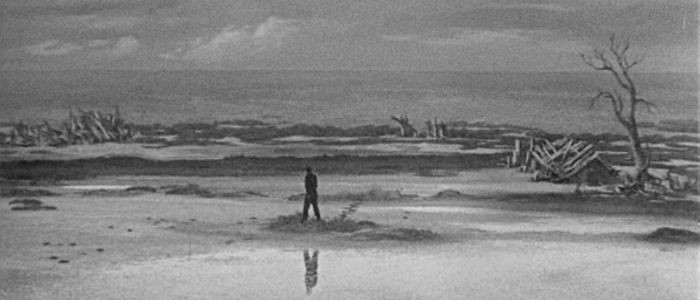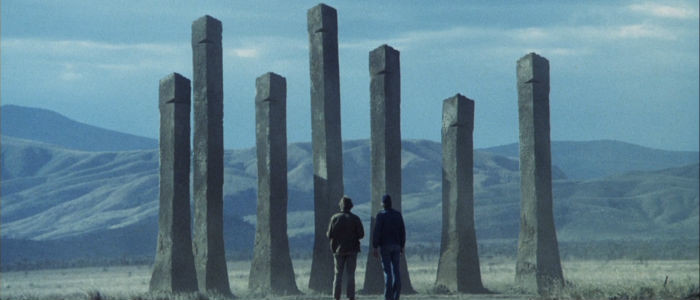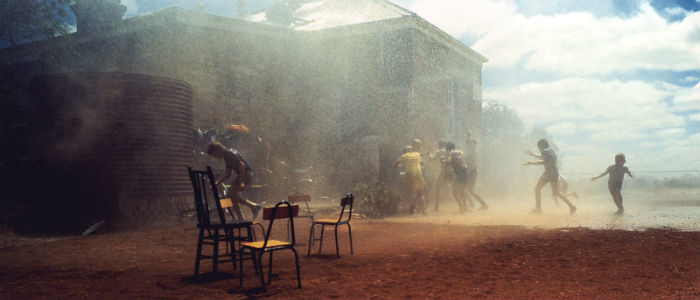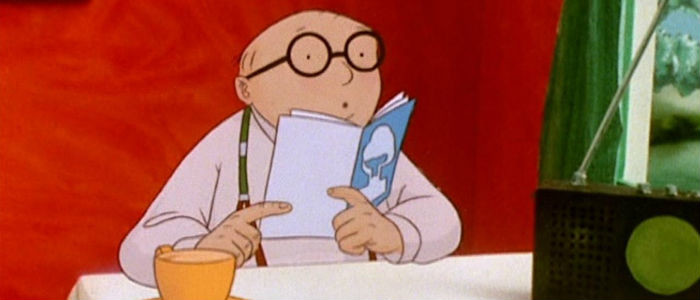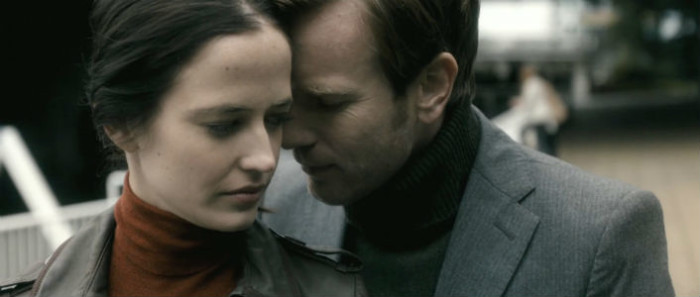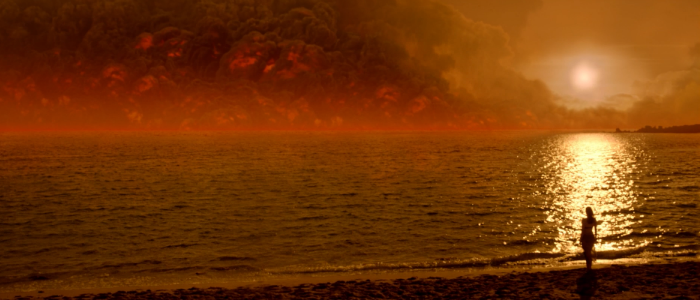The Best Movies You've Never Seen About The End Of The World As We Know It
(Welcome to The Best Movies You've Never Seen, a series that takes a look at slightly more obscure, under-the-radar, or simply under-appreciated movies. In this edition, we take a look at some of the best movies you've probably never seen about the end of the world as we know it.)Geostorm hits theaters this week, and if you're not even a little bit excited then I have to assume you're dead inside. Gerard Butler shoots storm fronts in the head and kicks tornadoes in the crotch... what's not to love?! The film promises some of that good old fashioned Roland Emmerich-esque nuttiness, blending massive amounts of CG destruction, an ensemble cast of somewhat recognizable faces, and some poor shmuck's sacrifice in an effort to save what's left of humanity. (My money's on Butler as the shmuck.)
Of course, not all end of the world movies are traditional disaster films. Some destroy cities like Emmerich's 2012 and The Day After Tomorrow. Some focus on a handful of people fueled by rumor but reacting as if it were fact (Miracle Mile). Some unleash a viral plague that wipes out most of mankind (28 Days Later). And some feature massive demon with giant... Err, some are This Is the End. The common thread between them, whether they feature massive amounts of destruction or not, is the suggestion or reality that humanity is on the way out or at least in store for a world-changing shake up.
Keep reading for a look at six terrific movies you probably haven't seen about the end of the world as we know it.
Deluge (1933)
Unnatural weather patterns are followed by a massively devastating earthquake that rumbles beneath the ocean, and while it destroys large swathes of land and kills millions outright, the damage is far from over. Giant tsunamis annihilate much of what's left of civilization leaving small pockets of humanity left struggling to survive.
You wouldn't expect the early 1930s to be home to one of cinema's great disaster epics, but Felix E. Feist's apocalyptic yarn is just that. Skyscrapers crumble and fall as the earth shakes and giant waves smash against them, and while the science is wonky, it would feel right at home in an Emmerich picture. After the initial destruction leaves millions dead, the film settles into a tale of individual survivors, small communities, and a roving band of men doing grisly things to women. Two survivors – a man who was separated from his family, and a woman who was rescued by two other men who soon begin to squabble over her like property – eventually come together and fall in love, but there are still two more dramatic turns to come.
The film's pre-code status means the leading lady gets to gallivant around in her underwear – every time she enters the water she ends up in her underwear, and she gets in the water a lot – and it leads to some disturbing setups and implications straight out of a modern-day post-apocalyptic adventure. It's made clear that while nature and the earth itself struck out against humanity, mankind remains its own greatest enemy.
Phase IV (1974)
A pair of desert-based scientists discover some odd behavior in a nearby ant colony, and while it's little more than fascinating at first, they soon discover more dangerous implications. The ants are displaying an alarming intelligence, and they have some demands.
Saul Bass was already a successful title/poster designer when he took on directing duties for his singular feature film, and as should be expected, he brings a strong visual sense to the sci-fi/horror story. Macro-photography brings viewers up close and personal to the ants, and their actions – both mundane and war-like – become every bit as engrossing as their human counterparts. A battle erupts bringing with it suspense, victories, and losses, but it turns terrifying (and very, very cool) once the ants start communicating. It becomes clear that if this colony succeeds in their effort to grow and defeat these humans, the rest of mankind is next.
There's an analytical dryness to much of the film, to the point that it feels very Michael Crichton-like at times, but far from distancing itself from viewers, the approach actually enhances the experience. We're right in there with both the scientists and the ants, and as the tensions and "war" escalate, the implication that it's a much bigger deal than just this one colony would suggest becomes clear. The ending was trimmed by the studio from Bass' longer, trippier conclusion, but more than enough remains to hit viewers with a fantastic "what if?" of a warning as the ants' ultimate aim becomes clear.
The Last Wave (1977)
A lawyer in Australia is tasked with a case involving Aboriginal men accused of murdering one of their own. The trial coincides with a series of dreams he's been experiencing, and the more he learns about his clients' beliefs, the more he begins to suspect that not only are his visions connected and that they're portending something devastating.
Peter Weir chased his classic Picnic at Hanging Rock with this apocalyptic mystery that sees an increase in odd weather patterns plaguing a citizenry who barely have time to notice. Life goes on and so will they, presumably, but our intrepid lawyer – played by an increasingly embattled Richard Chamberlain – soon suspects otherwise. The film relies more on ideas that might be deemed supernatural or magical than the others on the list, but it's no less affecting for it. In fact, the characters' connections to the earth and nature lend it narrative weight as the otherwise modern lawyer finds himself growing more in tune with the visions that ail him.
It's ultimately a powerful indictment of our ego in the face of our actual insignificance and ignorance, and Weir lends the increasing despair an air of beauty and wonder despite the implications. Dreams, reality, and collective fears all come into play, and the lawyer – along with others – is forced to acknowledge that for all our knowledge, there are things that exist well beyond us. Fans of Jeff Nichols Take Shelter – and really, that should be all of you – will want to check this one out sooner rather than later.
When the Wind Blows (1986)
A retired couple living a quiet life outside London see their calm disrupted by news of impending war. They craft a bomb shelter of sorts, secure in the knowledge that it and their government will keep them safe. An atomic blast hits England, and as the days turn to weeks, the couple feels confident that surviving the bomb marks the end of their worries.
Fans of bleakly beautiful animation need look no further than Jimmy T. Murakami's adaptation of Raymond Briggs' book, which captures the willful ignorance (and blind optimism) of citizens whose faith in government exceeds reason. The couple at the core of the film, James and Hilda, go about their business after the attack, secure in their belief that everything will be okay if they just keep moving forward. We see the truth, though. With each passing day, fewer survivors pass through the frame, food grows scarce, and the loving couple begin losing their hair to radiation sickness. It's a slow but inevitable descent towards death with people going out of their way to avoid reality, and it's devastating to behold.
The animation – a mix of traditional and stop-motion back drops – is paired with a score by Roger Waters and songs by David Bowie, Genesis, and more to great effect. There's an absurdity to some of what the couple does in an effort to protect themselves from bombs and radiation, but there's also a sadness that gets highlighted by the music. As the film winds down, its theme becomes clearer and clearer in its recognition of the futility before the destructive power of nuclear war. It doesn't soft-pedal reality, and unfortunately, its message is still a relevant one today with a populace unprepared for what the next war could bring.
Perfect Sense (2011)
A chef and a scientist meet and fall in love just as a strange viral infection begins spreading around the globe. People experience an extreme emotional reaction followed immediately by the universal loss of a sense. Smell is the first to go, followed soon after by taste, and as humanity struggles to adapt, the losses continue.
I'm an admitted sucker for powerfully bleak romances – Comet, Closer, and others – and this film's pairing of romantic love with apocalyptic design leaves it among my favorites. We're caught up in what's happening on a worldwide scale, but the film keeps our focus intimate and secured on the couple at its core. We're pulling for them through moments of sweetness, discovery, and loss, and it only grows more powerful when we know hearing and sight are next on the table. It's far from a typical apocalyptic tale, but that's part of its charm.
The two leads are played beautifully by Eva Green and Ewan McGregor, and they do some of the best work of their respective careers. It's a film with no antagonist, no tangible enemy to fight or avoid, and that means more time is spent getting to know these characters together in down time and in the face of growing crisis. Their affection for each other faces challenges brought on by the epidemic, and the illness takes the place of more traditional obstacles in standard romances, even as it's appearing to doom the big picture, too. It's a highly romantic film despite the setup, and I honestly can't recommend it enough.
These Final Hours (2013)
An asteroid has struck Earth and while billions died straight away the ensuing firestorm circling the globe is set to strike Australia in twelve hours. Distraught, confused, and angry at his girlfriend's revelation that she's pregnant, James leaves her behind to attend a mind-numbing party instead, but as the hours tick down, he discovers more about himself than he's ever known.
Zak Hilditch's thriller tackles the apocalypse far differently than his more well-known Australian brethren – George Miller, etc – but he also finds far more emotional weight along the way. The film opens with the knowledge that world is ending – no doubts, no possibility of averting the crisis, no chance of survival. It's a hell of a way to start a film, but while it's unavoidably a downer, the movie still finds ways to build momentum, show real heart, and make audiences cheer. Thrills both visceral and emotional fill the screen as James realizes what's important in a world that no longer cares.
The end of the world leaves people good and bad in its wake, and our protagonist has to choose which he'll be – knowing full well that it really doesn't matter in the end. Or does it? Our values are what we make them, and as with most things, their true worth is only visible in times of need. Action beats, suspense scenes, and a journey of redemption are all packed into a short amount of time, and it all works to craft an immensely satisfying journey towards a powerful – and maybe inevitable – ending.

